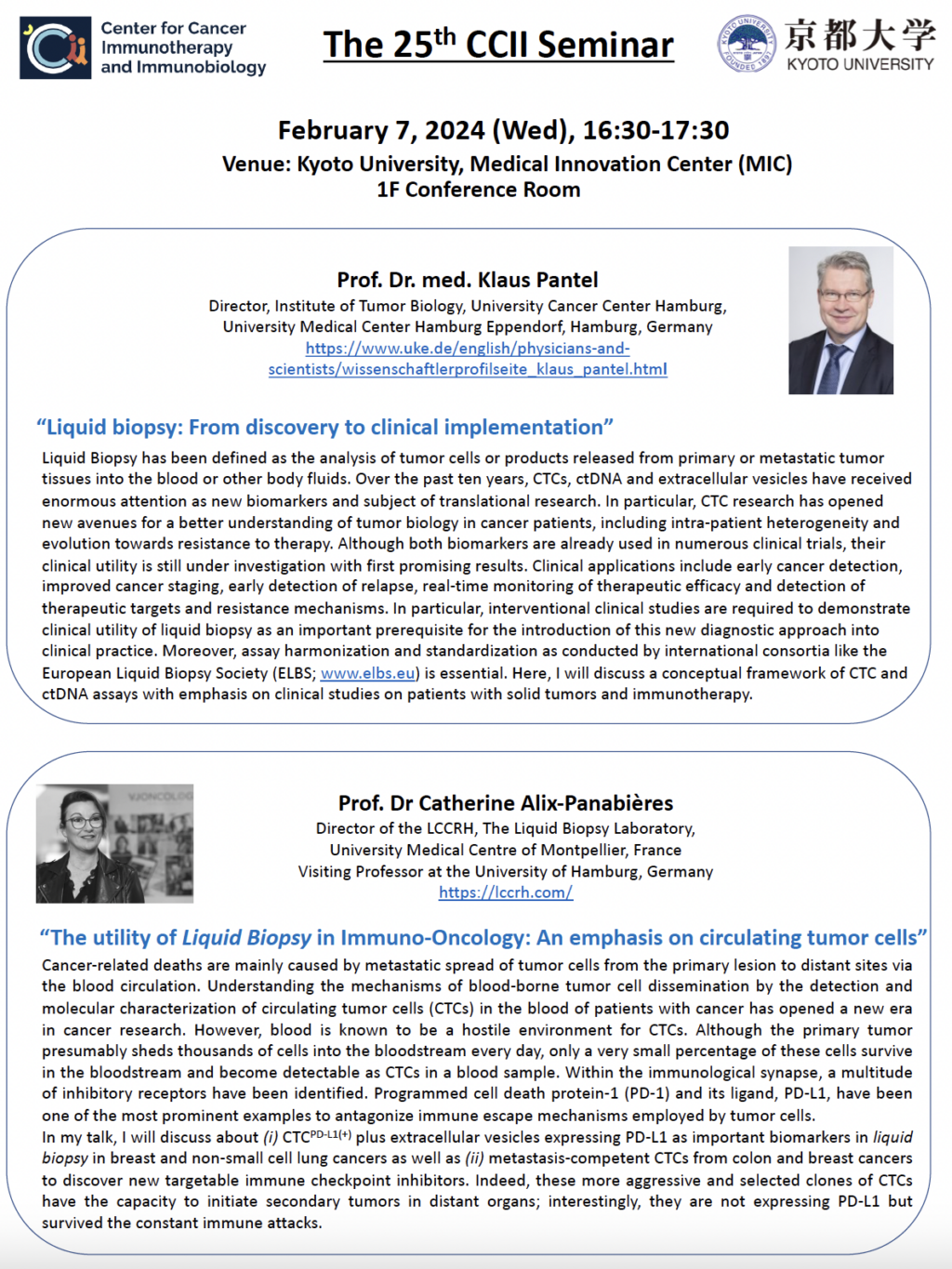Date & Time
- 7th February 2024, 16:30-17:30
- Venue: Kyoto University, Medical Innovation Center (MIC), 1F Conference Room
- On-site participation, admission free
- Organizer: Centre for Cancer Immunotherapy and Immunobiology (CCII)
Speaker
“Liquid Biopsy: From Discovery to Clinical Implementation”

Prof. Dr. med. Klaus Pantel
Director
Institute of Tumor Biology, University Cancer Center Hamburg
University Medical Center Hamburg Eppendorf
Hamburg, Germany
“The utility of Liquid Biopsy in Immuno-Oncology: An emphasis on circulating tumor cells”

Dr. Catherine Alix-Panabières
Director
The LCCRH, The Liquid Biopsy Laboratory
University Medical Centre of Montpellier
France
Visiting Professor at the University of Hamburg
Germany
Abstracts
“Liquid Biopsy: From Discovery to Clinical Implementation”
Liquid Biopsy has been defined as the analysis of tumor cells or products released from primary or metastatic tumor tissues into the blood or other body fluids. Over the past ten years, CTCs, ctDNA and extracellular vesicles have received enormous attention as new biomarkers and subject of translational research. In particular, CTC research has opened new avenues for a better understanding of tumor biology in cancer patients, including intra-patient heterogeneity and evolution towards resistance to therapy. Although both biomarkers are already used in numerous clinical trials, their clinical utility is still under investigation with first promising results. Clinical applications include early cancer detection, improved cancer staging, early detection of relapse, real-time monitoring of therapeutic efficacy and detection of therapeutic targets and resistance mechanisms. In particular, interventional clinical studies are required to demonstrate clinical utility of liquid biopsy as an important prerequisite for the introduction of this new diagnostic approach into clinical practice. Moreover, assay harmonization and standardization as conducted by international consortia like the European Liquid Biopsy Society (ELBS; www.elbs.eu) is essential. Here, I will discuss a conceptual framework of CTC and ctDNA assays with emphasis on clinical studies on patients with solid tumors and immunotherapy.
“The utility of Liquid Biopsy in Immuno-Oncology: An emphasis on circulating tumor cells”
Cancer-related deaths are mainly caused by metastatic spread of tumor cells from the primary lesion to distant sites via the blood circulation. Understanding the mechanisms of blood-borne tumor cell dissemination by the detection and molecular characterization of circulating tumor cells (CTCs) in the blood of patients with cancer has opened a new era in cancer research. However, blood is known to be a hostile environment for CTCs. Although the primary tumor presumably sheds thousands of cells into the bloodstream every day, only a very small percentage of these cells survive in the bloodstream and become detectable as CTCs in a blood sample. Within the immunological synapse, a multitude of inhibitory receptors have been identified. Programmed cell death protein-1 (PD-1) and its ligand, PD-L1, have been one of the most prominent examples to antagonize immune escape mechanisms employed by tumor cells. In my talk, I will discuss about (i) CTCPD-L1(+) plus extracellular vesicles expressing PD-L1 as important biomarkers in liquid biopsy in breast and non-small cell lung cancers as well as (ii) metastasis-competent CTCs from colon and breast cancers to discover new targetable immune checkpoint inhibitors. Indeed, these more aggressive and selected clones of CTCs have the capacity to initiate secondary tumors in distant organs; interestingly, they are not expressing PD-L1 but survived the constant immune attacks.

